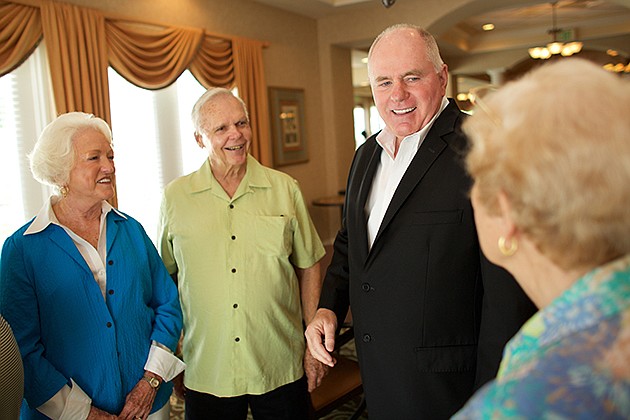- November 24, 2024
-
-
Loading

Loading

Every month, Thomas Harrison organizes a team-member appreciation event for the employees of Discovery Senior Living.
Harrison hands out bonuses in the form of paper checks, a meaningful gesture in an era of the impersonal direct-deposit wire transfers. “Yearly bonus plans are old news to me,” Harrison explains. “People want the immediacy of a reward. I want them to know I really care about them.”
It's not a job Harrison takes lightly. “It's a lot of work,” he says. “As a management philosophy, we pay at the high end of the spectrum.”
But there's a clear business strategy here: “By keeping turnover low, you keep residents happy,” Harrison explains. “Residents vote with their feet.”
This helps explain why Discovery Senior Living communities fill up before the company even finishes building them. Because they're rental apartments, residents can move out just like they can with traditional apartments.
Fact is, Harrison is among the sharpest operators of senior living communities. Bonita Springs-based Discovery Senior Living grew revenues 55% in 2014 to $129.5 million.
Discovery Senior Living recently opened or is developing a half dozen senior-living communities under the Discovery Village brand from Tampa to Naples and on the east coast of Florida on land that Harrison acquired in the depths of the recession for pennies on the dollar. The well-appointed apartments include a busy schedule of activities and amenities such as a movie theater, an exercise facility with a walk-in pool and a physician's office on site.
Backed by private-equity firm Kayne Anderson Real Estate Advisors, Discovery reacquired the Aston Gardens apartments it had sold eight years ago. It's now expanding into Texas with acquisitions such as three Conservatory Senior Living communities in Houston, Dallas and Austin and adding other communities in Alabama and Georgia.
“There are a lot of operators...in Tom's business, but there are very few that are excellent,” says Max Newland, managing director with Kayne Anderson, which so far has invested $1.2 billion in Discovery projects totaling 5,000 units. “He's very hands-on, but he's built a very strong team around him that's very capable.”
Harrison had sold six Aston Gardens communities in Florida in 2006 to a joint venture of Sunrise Senior Living and General Electric for $450 million. It was a record price on a per-unit basis, he says.
But instead of calling it quits, the 67-year-old Harrison and his business partner Richard Hutchinson scouted new opportunities in the recession. “What Richard and I did was we started buying land,” Harrison says. “We started entitling it right away.”
Even though the financial crisis clouded the economic outlook, Harrison and Hutchinson reasoned that Florida's economy would eventually recover. “It took a lot of intestinal fortitude,” Harrison acknowledges.
One of the early investors in Discovery Senior Living was Al Hoffman, the former CEO of WCI Communities who built that company into a powerhouse on the ashes of the recession of the early 1990s. Hoffman and now-deceased WCI Chairman Don Ackerman had enlisted Harrison to turn Aston Gardens around.
Before cutting his teeth in the homebuilding business with companies such as Kaufman & Broad, Harrison was a U.S. Navy hospital corpsman who was embedded with the U.S. Marines in combat during the Vietnam War in 1969 and 1970. “I had more responsibility as a 19- and 20-year-old than I've had my whole life,” he recalls.
Harrison cuts an imposing figure, but he's soft-spoken, often closing his eyes while he speaks to find the right words. “Tom is very good at espousing the vision,” says Hutchinson. “He's a great motivator.”
The senior-living business model Harrison helped create is groundbreaking in many ways. “This industry was born in the not-for-profit world,” says Hutchinson. “Our pay for performance system is very strange for this industry, but it does attract super-talented folks.”
Newland says Harrison is detail-oriented and can recite a property's financials from memory. But more impressive is that employees beyond the C-suite know the numbers, too. “He runs a very performance-based operation,” Newland says. “It's music to my ears to have a partner who pays attention to profits.”
3 questions
Who is the unsung hero in your company?
“The caregivers and servers are the unsung heroes,” Harrison says. “They're the No. 1 reason for our success.”
Who are your mentors?
Don Ackerman, the now deceased chairman of Bonita Springs-based homebuilding and development company WCI Communities. “For 15 years, I could count on him to provide insight,” Harrison says. “He was a great sounding board.” Today, Harrison says he counts his wife, Michele, as a mentor. She's the former president of the Collier Building Industry Association and is now regional director of sales at WCI Communities.
What's the best advice you've ever received, in business or in life?
Harrison cites Ackerman: “Integrity is the cornerstone of any organization,” he says. The definition of integrity is doing the right thing when nobody's looking.
Growth Revenues
2012: $73.8 million
2013: $83.8 million
Ç14%
2014: $129.5 million
Ç55%
Employees
2012: 993
2013: 1,197
2014: 1,606
- Jean Gruss